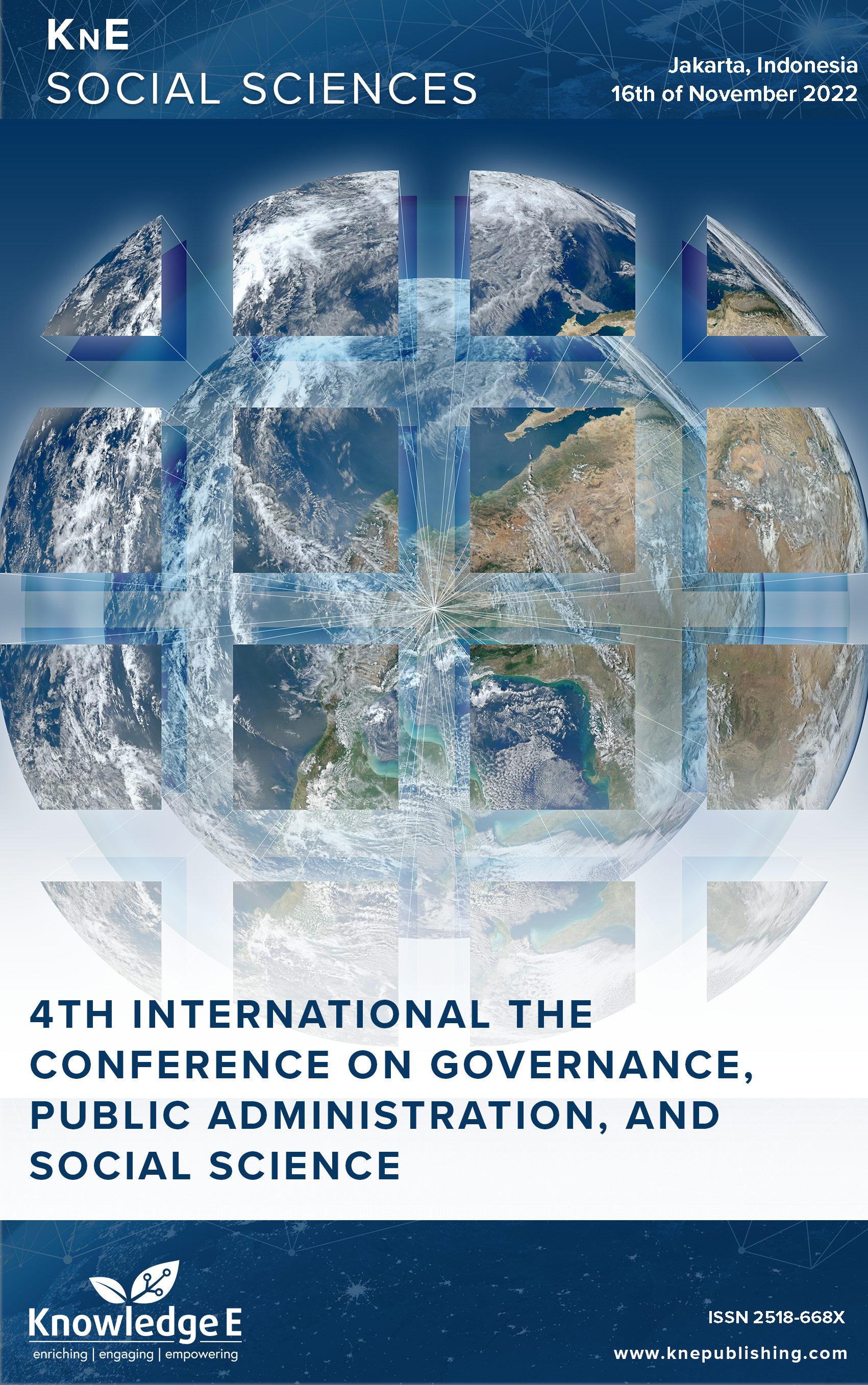Collaborative Governance in the Development of Digital Villages in Karanganyar Indonesia
DOI:
https://doi.org/10.18502/kss.v8i11.13557Abstract
Digital villages are important as one of the right solutions for increasing community participation and being more effective in the application of information and communication technology in village life. However, there are still digitalization problems in villages related to poor data quality and limited information on village potentials to reduce the quality of information services to the community and other related parties. The lack of intensive cooperation between the government, village communities, and the private sector is the main cause of this problem. This study aims to explore the impact of collaborative governance on supporting the development of a digital village in Karanganyar Indonesia. The main sources of data in this study were obtained from in-depth interviews, FGDs, and relevant secondary data. The results of the study indicate that the development of digital villages has led to an increase in the capacity of hardware and various application systems so that they can provide varied information services and serve as a medium for improving the community’s economy. In addition to mutual agreement in overcoming problems, making the right decisions, collaboration, and collective learning, the capacity and commitment of the village head are also important triggers for the achievement and reputation of digitalization in Karanganyar village. The practical implications of this study recommend flexibility in implementing central government policies and provide wider space for creativity and innovation to village officials according to their capabilities in developing digitalization of services and various potentials in the village. This research also offers further studies related to collaboration procedures and mechanisms to accelerate the digital villages development.
Keywords: collaborative governance, development, digitalization, village
References
[2] Undang-Undang Nomor 6 Tahun 2014 tentang Desa.
[3] Permendes Nomor 13 Tahun 2020
[4] Simanungkalit DE. Program Desa Digital Bantu Wujudkan Pemerintahan Pintar. Kementerian Komunikasi dan Informatika: Ditjen Aptika. 2021. https://aptika.kominfo.go.id/2021/12/program-desa-digital-bantu-wujudkanpemerintahan- pintar/
[5] Islamy LO. Collaborative Governnace, Konsep dan Aplikasi. Yogyakarta: Deepublish Publiser; 2018.
[6] Undang-Undang Nomor 32 Tahun 2004 tentang Pemerintahan Daerah.
[7] Maschab M. Politik Pemerintahan Desa di Indonesia. Jogjayakarta: PolGov. 2013.
[8] Sulistiyani, Poerbo, Suwardi, Karnowahadi, Aryono. Model Pengembangan Desa Kreatif Berkarakter Budaya Lokal. Prosiding Seminar Hasil Penelitian dan Pengabdian Masyarakat. 2020;3(1):1118-1127.
[9] Telkom University. Tel-U Jadi Tuan Rumah Pengumumam Top 150 Social Project Innovillage 2022. https://telkomuniversity.ac.id/en/tel-u-jadi-tuan-rumahpengumuman- top-150-social-project-innovillage-2022/.2022
[10] European Commission. EU Action for Smart Villages. European Commission; 2014.
[11] Zavratnik V, Kos A, Duh ES. Smart villages: Comprehensive review of initiatives and practices. Sustainability (Basel). 2018;10(7):1–14.
[12] Li L, Su F, Zhang W, Mao J. Digital transformation by SME entrepreneurs: A capability perspective. Inf Syst J. 2017. https://doi.org/10.1111/isj.12153
[13] 13. AAAS, Eurekalert. Malaysia’s ’Smart Villages’ and 9 other proven ideas for sustainable development. 2014. Retrieved from www.eurekalert.org: https://www.eurekalert.org/pub_releases/2014-09/tcamv091414. php.
[14] Faujiah A. Building the “Smart Village” through the implementation of the nonformal education to improve English language skills in the village of Geluran Taman Sidoarjo. J Educ. 2017;2(1):114–124.
[15] Fiseha GG, Oyelana AA. An assessment of the roles of small and medium enterprises (SMEs) in the local economic development (LED). S Afr J Econ. 2017;6(3):280–290.
[16] Tambunan TH. Development of small and medium enterprises in a developing country: the Indonesian case. J Enterp Communities: People and Places in the Global Economy. 2011;5(1):68–82.
[17] Tambunan TH. SME in Asian developing countries. London: Palgrave Macmillan Publisher; 2009. https://doi.org/10.1057/9780230250949.
[18] Tambunan TH. Development of micro, small and medium enterprises and their constraints: A story from Indonesia. Gadjah Mada Int J Bus. 2011b;13(1):21–43.
[19] Nugroho MA, Susilo AZ, Fajar MA, Rahmawati D. Exploratory study of SMEs technology adoption readiness factors. Procedia Comput Sci. 2017;124:329–336.
[20] Yuldinawati L, Tricahyono D, Anggadwita G, Alamanda DT. Towards a framework for ICT-based entrepreneurship development through business incubation processes: Case study of a techno park. Int J Bus Glob. 2018;21(1):32–45.
[21] Rahab, Hartono J. Adoption of information technology on small businesses: The role of environment, organizational and leader determinant. Int J Bus Hum Technol. 2012;2(4):60–66.
[22] Li B, Qian J, Xu J, Li Y. Collaborative governance in emergencies: Community food supply in COVID-19 in Wuhan, China. Urban Governance. 2022. https://www.sciencedirect.com/science/article/pii/S266432862200002X
[23] Webb A. Webb. Coordination: A problem in public sector management. Policy Polit. 1991;19(4):229–242.
[24] Schirch. Where does whole of government meet whole of society?” Conflict management and” whole of government. Useful tools for US National Security Strategy? 2012:127.
[25] Dubb SS. Coronavirus pandemic: Applying a whole-of-society model for the wholeof- the world. Br J Oral Maxillofac Surg. 2020 Sep;58(7):838–842.
[26] Figtree GA, Jennings G, Nicholls S, Graham RM. The Australian cardiovascular alliance–towards an integrated whole-of-nation strategy to address our major health burden Heart. Heart Lung Circ. 2019 Feb;28(2):198–203.
[27] Bekker, Helderman, Jansen, Ruwaard. The conditions and contributions of ‘whole of society’ governance in the Dutch ‘All about Health…’ programme. In: Greer SL, Wismar M, Pastorino G, Kosinska M, (Eds.). Civil Society and Health, World Health Organization. 2017. 159-180.
[28] Plummer T. Community participation in China: Issues and processes for capacity building. Routledge; 2013. https://doi.org/10.4324/9781849770835.
[29] Gray B. Collaborating: Finding common ground for multi party problems. San Fransisco. Jossey-Bass; 1989.
[30] Trist E. Referent organizations and the development of inter-organizational domains. Hum Relat. 1983;36(3):269–284.
[31] Zapata MJ, Hall CM. Public–private collaboration in the tourism sector: Balancing legitimacy and effectiveness in local tourism partnerships. The Spanish case. J Policy Res Tour Leis Events. 2012;4(1):61–83.
[32] Jamal TB, Getz D. Collaboration theory and community tourism planning. Ann Tour Res. 1995;22(1):186–204.
[33] Bramwell B, Sharman A. Collaboration in local tourism policymaking. Ann Tour Res. 1999;26(2):392–415.

